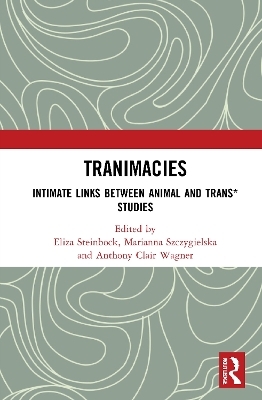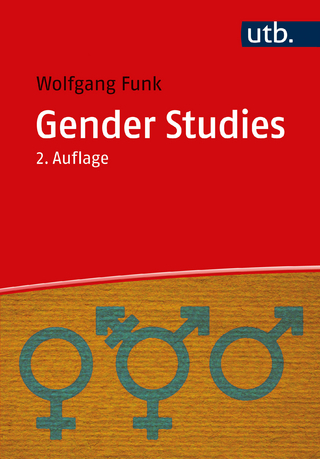
Tranimacies
Routledge (Verlag)
978-0-367-56717-0 (ISBN)
Tranimacies is a neologism that pushes and pulls together transness and animality so as to better germinate unruly, wily, perverse relationships between them, and their spawn. Through tranimacies the book aims at rethinking the linking of liberation struggles amongst former colonized peoples and lands, minoritized genders and sexualities, racially marked persons and non-human animals, and does so in a variety of geopolitical and temporal sites. This rich compendium includes original scholarship and dialogues as well as poetry, comix, bioart, and performance documentation.
The composite term of tranimacies enmeshes several everyday and scholarly concepts: transgender, animal, animacy, intimacies. This edited volume’s bundle of theoretical and artistic works insists on the beating heart of embodied experiences and political pulses at the core of these concepts. The authors show that tranimacies are spread throughout what Mel Y. Chen describes as the "animacy hierarchies" that delimit zones of possibility and agency, confounding the vertical order with transversal movements. As an intervention into the burgeoning debates within and across trans, animal, critical race, and posthuman studies this publication seeks to destabilize the logic of "turns" in critical theory, and through sticky intimacies uncover how animality, race, and gender underscore the humanist production of meanings. By taking a decolonial approach (in the main, but not exclusively) the authors hope to shift debates in animal studies towards accounting for and delinking from colonial mentalities. Three poems interweave our selection of chapters, which together forge three lines of inquiry defined by a certain ethos: transhistories of the present, lessons from the bestiary, and #animatingephemera.
The chapters in this book were originally published as a special issue of Angelaki.
Eliza Steinbock, Assistant Professor Cultural Analysis, Leiden University, Netherlands. Author of Shimmering Images: Trans Cinema, Embodiment, and the Aesthetics of Change (Duke, 2019), co-editor of Art and Activism in the Age of Systemic Crisis: Aesthetic Resilience (Routledge, 2020), project-leader of "The Critical Visitor" consortium, developing intersectional approaches for inclusive heritage (2020-2025). Marianna Szczygielska, Postdoctoral Fellow, Max Planck Institute for the History of Science, Germany. Author of scholarly publications on the history of zoos, human-animal relations and queer studies, and feminist activism, co-editor of "Plantarium: Human-Vegetal Ecologies" special issue for Catalyst: Feminism, Theory, and Technoscience, (2019). Anthony Clair Wagner, Senior Lecturer Design, Linnaeus University, Sweden. Author of several articles on trans, monstrosity and art, for example "Visible Monstrosity as Empowerment," in Transgender Studies Quarterly 2.2. Workshop leader of the Monster Workshop and artist.
Introduction: Thinking Linking
Eliza Steinbock, Marianna Szczygielska, and Anthony Clair Wagner
Section I: Transhistories of the Present
1. Subclinical Routine #11, or "the True Story of a Miraculous Transformation"
Trish Salah
2. Impossibility of That
Eva Hayward and Che Gossett
3. Transcending the Human/Non-Human Divide. The Geo-politics and Body-politics of Being and Perception, and Decolonial Art
Madina Tlostanova
4. Precedence, Trans* and the Decolonial
Daniel B. Coleman and Rolando Vázquez
5. Implanting Plasticity into Sex and Trans/Gender. Animal and Child Metaphors in the History of Endocrinology
Jules Gill-Peterson
6. Hyenas and Hormones. Transpecies Encounters and the Traffic in Humanimals
Marianna Szczygielska
Section II: Lessons from the Bestiary
7. Ripple, Angel Quake
Trish Salah
8. Ego Hippo. The Subject as Metaphor
Florentin Félix Morin
9. Menagerie À Tranimals
Lindsay Kelley
10. Blurred
Marta Ostajewska
11. Monkey Business. Trans*, Animacy, and the Boundaries of Kind
Dylan McCarthy Blackston
12. Feral Biopolitics. Animal Bodies and/as Border Technologies
Hyaesin Yoon
13. Queer Affordances. The Human as Trans*Ecology
Tarsh Bates
Section III: #AnimatingEphemera
14. Croesus, at Least in Name
Trish Salah
15. Catties and T-Selfies. On the "I" and the "We" in Trans-Animal Cute Aesthetics
Eliza Steinbock
16. Biohacking Gender. Cyborgs, Coloniality, and the Pharmacopornographic Era
Hil Malatino
17. Trans*versal Animacies and the Mattering of Black Trans* Political Life
Abraham Weil
18. Trans Animisms
Abram J. Lewis
19. Interchanges
Myra Hird and Harlan Weaver
| Erscheinungsdatum | 26.05.2021 |
|---|---|
| Reihe/Serie | Angelaki: New Work in the Theoretical Humanities |
| Verlagsort | London |
| Sprache | englisch |
| Maße | 174 x 246 mm |
| Gewicht | 625 g |
| Themenwelt | Geisteswissenschaften ► Philosophie |
| Sozialwissenschaften ► Ethnologie | |
| Sozialwissenschaften ► Soziologie ► Gender Studies | |
| ISBN-10 | 0-367-56717-2 / 0367567172 |
| ISBN-13 | 978-0-367-56717-0 / 9780367567170 |
| Zustand | Neuware |
| Haben Sie eine Frage zum Produkt? |
aus dem Bereich


